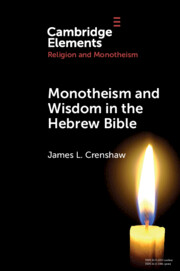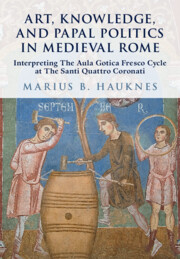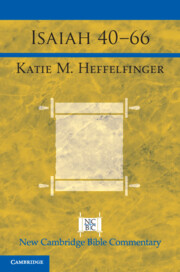Refine search
Actions for selected content:
20 results
Chapter 1 - The Personified Will
-
- Book:
- The Will in English Renaissance Drama
- Published online:
- 04 September 2025
- Print publication:
- 18 September 2025, pp 32-62
-
- Chapter
- Export citation
Are international organizations agents in their own right? A plural subject perspective
-
- Journal:
- International Theory , First View
- Published online by Cambridge University Press:
- 15 September 2025, pp. 1-29
-
- Article
-
- You have access
- Open access
- HTML
- Export citation

Monotheism and Wisdom in the Hebrew Bible
- An Uneasy Pair?
-
- Published online:
- 09 February 2025
- Print publication:
- 13 February 2025
-
- Element
- Export citation

Art, Knowledge, and Papal Politics in Medieval Rome
- Interpreting the Aula Gotica Fresco Cycle at Santi Quattro Coronati
-
- Published online:
- 30 January 2025
- Print publication:
- 30 January 2025

Isaiah 40–66
-
- Published online:
- 04 May 2024
- Print publication:
- 09 May 2024
Chapter 9 - The Many Sides of Personification
-
-
- Book:
- Literary Theory and Criticism in the Later Middle Ages
- Published online:
- 20 April 2023
- Print publication:
- 20 April 2023, pp 180-205
-
- Chapter
- Export citation
3 - The Nymph and the Cross
-
- Book:
- Twilight of the Godlings
- Published online:
- 09 March 2023
- Print publication:
- 30 March 2023, pp 136-193
-
- Chapter
- Export citation
Chapter 9 - American Literature and the Fiction of Corporate Personhood
- from Part II - Contemporary Critical Perspectives
-
-
- Book:
- The Cambridge Companion to Literature and Economics
- Published online:
- 28 July 2022
- Print publication:
- 11 August 2022, pp 148-162
-
- Chapter
- Export citation
Chapter 4 - Projects of Animation: Coleridge and Clare
-
- Book:
- Conversing in Verse
- Published online:
- 21 July 2022
- Print publication:
- 04 August 2022, pp 90-109
-
- Chapter
- Export citation
Chapter 8 - Saying the Other
- from Part 3 - The Context of Late Antiquity
-
-
- Book:
- Greek and Latin Poetry of Late Antiquity
- Published online:
- 16 June 2022
- Print publication:
- 30 June 2022, pp 153-173
-
- Chapter
- Export citation
11 - The Multiple Personalities of Celsus’ Jew
-
-
- Book:
- Celsus in his World
- Published online:
- 18 November 2021
- Print publication:
- 25 November 2021, pp 360-393
-
- Chapter
- Export citation
1 - The Temple of Heaven Is Not China
- from Part I - Theoretical Perspectives
-
- Book:
- Unpacking Creativity
- Published online:
- 14 August 2021
- Print publication:
- 02 September 2021, pp 7-35
-
- Chapter
- Export citation
The role of characterisation in everyday voice engagement and AVATAR therapy dialogue
-
- Journal:
- Psychological Medicine / Volume 52 / Issue 16 / December 2022
- Published online by Cambridge University Press:
- 08 April 2021, pp. 3846-3853
-
- Article
-
- You have access
- Open access
- HTML
- Export citation
Chapter Five - Conclusion
-
- Book:
- Rhetoric and Innovation in Hellenistic Art
- Published online:
- 16 May 2020
- Print publication:
- 16 April 2020, pp 132-134
-
- Chapter
- Export citation
Chapter Three - Personification in the Archelaos Relief
-
- Book:
- Rhetoric and Innovation in Hellenistic Art
- Published online:
- 16 May 2020
- Print publication:
- 16 April 2020, pp 67-109
-
- Chapter
- Export citation
Chapter One - Rhetoric, Innovation, and the Courts
-
- Book:
- Rhetoric and Innovation in Hellenistic Art
- Published online:
- 16 May 2020
- Print publication:
- 16 April 2020, pp 1-30
-
- Chapter
- Export citation
Personification in Homer
- from Key Topics
-
- Book:
- The Cambridge Guide to Homer
- Published online:
- 22 February 2020
- Print publication:
- 05 March 2020, pp 369-371
-
- Chapter
- Export citation
THE CITY SPEAKS: CITIES, CITIZENS, AND CIVIC DISCOURSE IN LATE ANTIQUITY AND THE EARLY MIDDLE AGES
-
- Article
-
- You have access
- Open access
- HTML
- Export citation
25 - Linguistic anthropology and sociocultural anthropology
- from Part V - Interdisciplinary perspectives
-
-
- Book:
- The Cambridge Handbook of Linguistic Anthropology
- Published online:
- 05 October 2014
- Print publication:
- 11 September 2014, pp 626-643
-
- Chapter
- Export citation
11 - Pictures and passions in the Timaeus and Philebus
- from Part III - After the Republic
-
-
- Book:
- Plato and the Divided Self
- Published online:
- 05 March 2012
- Print publication:
- 16 February 2012, pp 259-280
-
- Chapter
- Export citation
